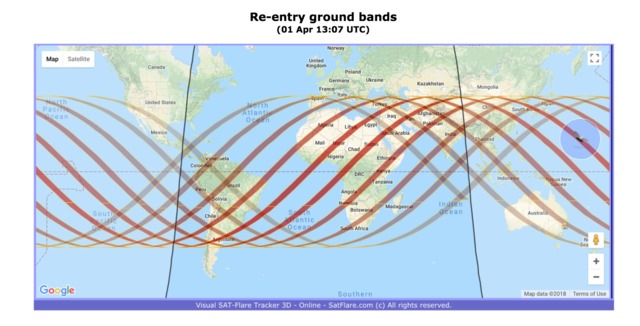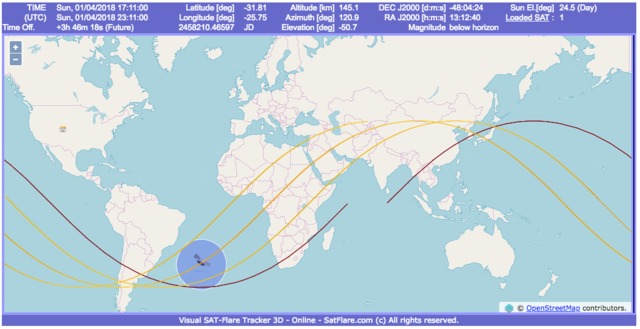DENVER – A Chinese space station is expected to plummet back to Earth Sunday night, but are what the chances Colorado could be hit by its falling debris?
That’s an important question to ask because while most of the space station is expected to burn up during re-entry, there is some concern that debris could make landfall.
Some states, like Michigan, went as far as activating the state’s emergency operations center earlier this week to monitor the re-entry of China’s Tiangong-1 space lab.
The latest information from the European Space Agency (ESA) has a re-entry forecast time for the Tiangong-1 space station centered at around 7 p.m. MDT, give or take a couple of hours.
#Tiangong1 monitoring almost complete - ESA's #spacedebris team forecasting reentry during a window of about four hours centred on 01:07 UTC (03:07 CEST) on 2 April
Summary & FAQ: https://t.co/pvPdVBiPp4 pic.twitter.com/FWYplRnXXZ— ESA (@esa) April 1, 2018
Early Sunday morning, SATFLARE forecasters, who are tasked with tracking all satellites orbiting Earth in real time, had put the space lab’s path of re-entry in a band stretching from northern California, southern Nevada, central Arizona, southern New Mexico and west Texas. The state of Colorado was excluded from the re-entry path.

Image courtesy: SATFLARE
By Sunday afternoon, North America altogether was excluded from the space station’s path of re-entry.

Image courtesy: SATFLARE
Scientists have emphasized the danger of being hit by falling debris is tiny, as low as one in 1 trillion, as the structure is likely to burn up in the atmosphere during re-entry.
"There is no need for people to worry about its re-entry into the atmosphere," an article by the China Manned Space Engineering Office published on state media said.
"It won't crash to the Earth fiercely, as in sci-fi movie scenarios, but will look more like a shower of meteors."
Despite the predictions and forecasts, scientists still warn that it's very hard to predict a precise location of re-entry for any satellite orbiting earth.
The Tiangong-1 was launched in September 2011 as a prototype for China's ultimate space goal: a permanent space station which is expected to launch around 2022.
But the Chinese government told the United Nations in May 2017 their space lab had "ceased functioning" in March 2016, without saying exactly why.
NASA's first space station, Skylab, fell to Earth in an out-of-control re-entry in 1979, burning up harmlessly in the process.
The last space outpost to drop was Russia's 135-ton Mir station in 2001, which made a controlled landing with most parts breaking up in the atmosphere.
According to CNN, space debris could contain hydrazine, a highly toxic and corrosive substance. Officials have said in the past that any suspected space debris should be considered hazardous.
International law and the United Nations Office for Outer Space Affairs (UNOOSA) Rescue Agreement state that you must immediately report any space debris that may crash in your property to local authorities, as “recovered space objects belong to the owner and governments are obliged to return them,” an ESA official said Sunday.
CNN contributed to this report.


